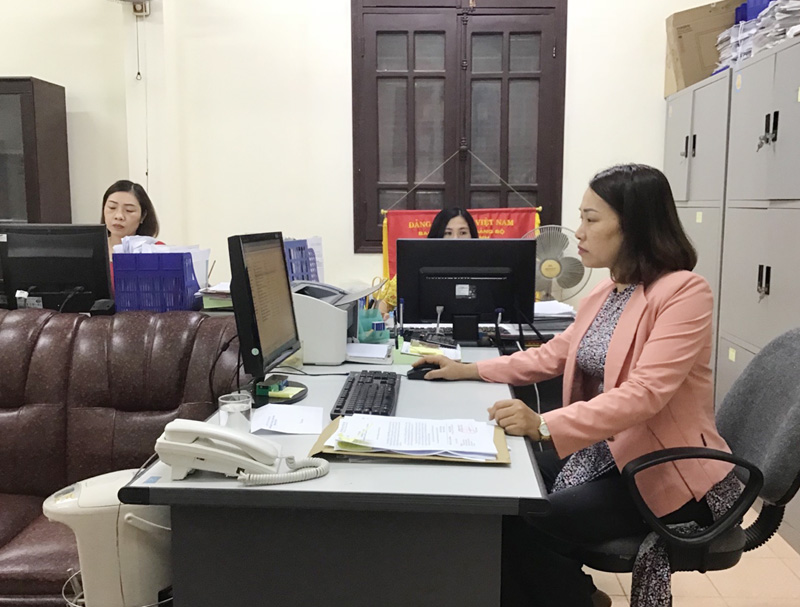
(HBO) - Hoa Binh has for years implemented the 11th Politburo’s Resolution 36-NQ/TW, dated 1/7/2014, and Plan No. 121-KH/TW of the standing board of the provincial Party Committee on promoting IT application and development to meet requirements of sustainable development and international integration. As a result, the awareness on the matter among local authorities at all levels and public personnel has been improved remarkably.
 Officials and civil
servants of the Party Committee of Cao Phong district paid attention to applying
IT to improve professional performance.
Officials and civil
servants of the Party Committee of Cao Phong district paid attention to applying
IT to improve professional performance.
In order to institutionalise and put the resolution into
practice, in 5 years (2014 – 2018), Hoa Binh had issued one agreement, 17
decisions and five plans on cooperation in terms of IT application across
fields, particularly in administrative reform. In addition, the province paid
attention to completing, supplementing and guiding the implementation of administrative
processes, standards and regulations. Designing evaluation criteria system and financial
and investment mechanisms for the work was also important.
According to the provincial Party Committee’s standing board,
to realise the goal of making three strategic breakthroughs, Hoa Binh has been
focused on using IT application to boost administrative reform; building an e-governance
system and providing online public services. To date, e-office software has
been used in People’s Committees, departments and agencies from provincial to
communal levels. The system has been linked to the National E-Document Exchange
Platform, allowing the exchange of documents online through four levels,
contributing to bettering management, improving working efficiency, saving
time and cutting paper costs.
The electronic single-window software, installed at the
provincial Public Service Center since August 2017, has so far connected all of
the local departments and sectors. Hoa Binh has mobilised funds from many
sources to build IT technical infrastructure and train human resources, among
others.
Such efforts have helped local cadres and public workers make
use of the advantages and minimise negative impacts brought about by the 4th
Industrial Revolution./.
The Standing Board of the Hoa Binh provincial Party Committee has agreed in principle on a proposal by the Standing Board of the Party Committee of Hoa Binh city to gather feedback on the city’s 1:2000 zoning plan, which forms part of its broader urban development strategy.
Hoa Binh province has made notable progress in public administration reform and digital government development, with the satisfaction index among citizens and businesses reaching over 84%, according to recent government evaluations.
Thanks to great efforts by local authorities in recent times, the governance and public administration performance of Mai Chau district has been significantly improved.
In the afternoon of June 6, the Party Committee, the People's Council, the People's Committee and the Fatherland Front of Lac Son district solemnly held a meeting to celebrate the 139th anniversary of the district's founding (1886–2025) and the 79th anniversary of the establishment of the district's Party Committee (1946–2025). There was the attendance of Mr. Bui Van Thang, the Vice Chairman of the Provincial People's Council; Mr. Quach Tat Liem, the Vice Chairman of the Provincial People's Committee; Ms. Dang Bich Ngoc, the Deputy Head of the National Assembly Delegation of the province; as well as the former leaders of the province and district through various periods, who are the natives of the district.
Implementing the Politburo’s Resolution No. 57-NQ/TW on breakthroughs in science – technology, innovation, and digital transformation is a golden opportunity for the northern mountainous province of Hoa Binh to renew growth model, improve competitive edge and shorten digital gap.
Resolution 57-NQ/TW, issued by the Politburo on December 22, 2024, identifies sci-tech, innovation, and digital transformation as strategic breakthroughs to build a developed and prosperous nation. In Hoa Binh province, this spirit is not just a slogan, it’s being put into action through concrete initiatives that form a "new development triangle”: digital citizenship, digital economy, and digital administration.



 Officials and civil
servants of the Party Committee of Cao Phong district paid attention to applying
IT to improve professional performance.
Officials and civil
servants of the Party Committee of Cao Phong district paid attention to applying
IT to improve professional performance.